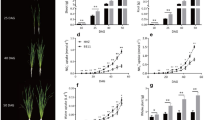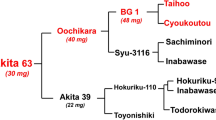Abstract
IN India rice is normally harvested when ripe by cutting off the leaves and stems near ground-level. Shortly before this operation the field is allowed to dry. There is very little regeneration, though it is well known that rice can be propagated vegetatively by ‘ratooning’. In 1958 three small plots of 5.2 square metres each at Giridih in Bihar were planted with the aus (rapidly maturing) variety CH-10 in July. Owing to the late monsoon the crop was poor. Instead of drying and cutting as usual, the plots were not allowed to dry, and the ears were plucked by hand on October 10. The plots produced a second crop which was harvested on November 23 by the usual method. Table 1 shows the yield of paddy for two harvests of the three plots.
This is a preview of subscription content, access via your institution
Access options
Subscribe to this journal
Receive 51 print issues and online access
$199.00 per year
only $3.90 per issue
Buy this article
- Purchase on Springer Link
- Instant access to full article PDF
Prices may be subject to local taxes which are calculated during checkout
Similar content being viewed by others
Author information
Authors and Affiliations
Rights and permissions
About this article
Cite this article
ROY, S. Second Flowering in Oryza sativa (var. indica). Nature 183, 1458–1459 (1959). https://doi.org/10.1038/1831458c0
Issue Date:
DOI: https://doi.org/10.1038/1831458c0
Comments
By submitting a comment you agree to abide by our Terms and Community Guidelines. If you find something abusive or that does not comply with our terms or guidelines please flag it as inappropriate.



